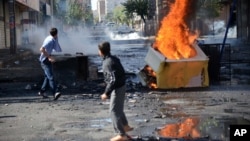The European Union and human rights organizations say the Turkish government's proposed expansion of police powers are part of a dramatic shift toward an authoritarian state.
The most controversial aspects of the draft law include allowing police to detain protesters simply on suspicion that they have committed a crime and giving security forces the right to use lethal force against demonstrators using petrol bombs.
Emma Sinclair Webb of New York-based Human Rights Watch warns that the draft law constitutes a worrying extension of already formidable police powers.
"We are very afraid that this new measure would basically open the way to more use of firearms and more use of excessive force," Webb said.
She noted that the law would allow authorities to detain people up to 48 hours. "This would particularly happen during a demonstration, and they don't even specify that people have to have been caught really committing a really serious crime. So that's a very worrying precedent, and that could lead to mass arrests and mass detentions."
Webb also contended that the new law would result in a transfer of powers from the judiciary to police and government officials.
Aimed at unrest
But Turkish Prime Minister Ahmet Davutoglu strongly defends the new law. He argues that it's aimed at preventing the kind of nationwide unrest that followed protests in October by Kurds over the government's failure to support the besieged Syrian Kurdish town of Kobani. Nearly 50 people died in that unrest.
The new law, Davutoglu said, is aimed at protecting lives and property. He posed a question for Kurdish citizens: Would they rather live their lives and run their businesses in peace or have to deal with vandals throwing Molotov cocktails? The government, he said, will not let street gangs disturb public peace.
But further unrest could be in the offing, with the leader of the pro-Kurdish People’s Democracy Party, Selahattin Demirtas, warning of more demonstrations if the legislation is passed.
If Davutoglu "gives that much power to the police, gives them the right to kill, then he will shed blood, will be responsible for shedding blood," Demirtas said. "I am warning that the security package introduced by the government will seriously pave the way to bloodshed, and in order for the package not to pass, we are going to use all our democratic and oppositional means."
Pressure is also coming from the European Union, which Turkey seeks to join. The EU's Turkey rapporteur, Kati Piri, expressed concern about the legislation Thursday during a visit to Turkey, warning that democratic freedom and rule of law remains critical to Ankara’s membership bid.
Regression on rights
Cengiz Aktar of Istanbul’s Suleyman Sah University, who is also a columnist for the Zaman Today newspaper, said the new law is part of worrying trend of growing powers for Turkey's security forces. He warned that Ankara has regressed on human rights to the point that it no longer meets EU standards.
"Turkey as a negotiating country does not anymore comply with the Copenhagen political criteria, which is otherwise a must to begin the negotiations," Aktar said.
Ankara dismisses such claims, saying the country’s laws are similar to those of its Western allies. But on Tuesday, the EU's new foreign policy chief, Federica Mogherini, called for efforts to revitalize Ankara’s membership bid, warning there was a growing divergence between Turkey and the EU.
Observers warn that if the new law, which is expected to be easily passed by Turkey's parliament, leads to more fatalities at the hands of security forces, the repercussions are likely to be felt both at home and abroad.




